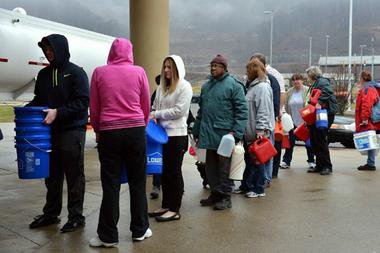

Waiting in line at a water truck in Charleston, W.Va., Jan. 10.
Charleston, W.Va., Jan. 19 — A chemical spill into the nearby Elk River has caused hundreds of local residents to be hospitalized. Now, 10 days after the initial spill, many of the 300,000 people who had to avoid tap water since Jan. 9 find it is still contaminated. People are still being burned and suffering respiratory stress and nausea when using the water after it was deemed safe.
Thousands of gallons of crude methyl cylcohexane methanol (MCHM) had oozed through a porous containment wall from a Freedom Industries’ containment tank into the river and subsequently passed into a water facility intake that serves the 300,000 area residents with tap water. The tanks had not been inspected since 1991.
Hospitals stayed open during the whole period. A nurse, who preferred to remain anonymous, told Workers World she received a chemical burn while working.
Freedom Industries then moved the containers of crude MCHM to nearby Nitro, W.Va. When the Department of Environmental Protection inspected the new storage location, it cited Freedom for five different violations, one of which was the lack of secondary containment structures. Other violations include failing to follow stormwater and groundwater guidelines, not filing monitoring reports and not properly storing drums with potential contaminants.
Freedom files for bankruptcy
Businesses and individuals have filed 30 lawsuits to make claims against Freedom of lost business, health concerns, medical monitoring and more. Some of the filings are potential class actions, and some seek punitive damages.
Freedom Industries filed for Chapter 11 bankruptcy protection on Jan. 17. The bankruptcy documents revealed that Freedom owes more than $2.4 million in taxes to the IRS dating back to 2000. The bankruptcy is likely aimed at sheltering Freedom from claims for the damage.
When a company files for Chapter 11, it must find a lender to finance its restructuring. This financer in turn gets first dibs on acquiring company assets if it goes under completely. A company named “Mountaineer Financing, LLC” is acting as financer for Freedom.
According to the West Virginia Secretary of State website, this company was incorporated the exact same day, Jan. 17, as Freedom declared bankruptcy. The website lists two officers of the company. The first officer listed for the new company is a man by the name of J. Clifford Forrest, who is also the current owner of Freedom Industries.
This maneuver could allow the owner to keep control of Freedom’s assets while avoiding some of the claims against Freedom. West Virginians are familiar with these questionable maneuvers.
For as long as can be remembered, industry bosses and the state Legislature have been hand in hand in fighting against regulation of things such as clean water. For instance, when a coal company pollutes the water, a private company such as West Virginia American Water will come in and supply clean water for aid.
The Jan. 16 Charleston Gazette reported that the “aid” water West Virginia America was distributing was itself contaminated. People refused to drink it as it smelled just like their contaminated water at home.
This aid is paid for not by the coal company but mainly through state and federal agencies. The coal giants have their way in West Virginia. In fact, King Coal’s irreparable damage to the water tables throughout the state is why as many as 300,000 people throughout the nine counties affected by the spill are all on one water intake in the first place.
Both Gov. Earl Ray Tomblin and U.S. Sen. Joe Manchin have been extremely active in the media attempting to convince everyone that the chemical spill was not the fault of the coal industry. Manchin defended Big Coal to Chris Hayes of MSNBC saying, “You wouldn’t have the country you have today if it wasn’t for the coal industry.”
The best Congress money can buy
Freedom Industries is not itself a coal company, however. It is a distributor of a chemical specifically used for the processing of coal for the Koch Industry subsidiary Georgia-Pacific.
The Huffington Post reported that House Speaker John Boehner had received $5,000 from Freedom’s vice president of sales and marketing. When pressed for a comment on the spill he said, “I am entirely confident that there are ample regulations already on the books to protect the health and safety of the American people.”
On Jan. 11, the same day as the chemical spill, the U.S. House of Representatives passed a Republican-sponsored bill that will gut U.S. toxic waste cleanup regulations. H.R. 2279, otherwise known as “The Reducing Excessive Deadline Obligations Act,” would basically eliminate the power of the Environmental Protection Agency to impose clean up deadlines and weaken the government in forcing companies to carry insurance for such spills. One of the five Democrats to cross party lines and support the bill was West Virginia Rep. Nick Rahall.
In its ongoing genocidal campaign against the Palestinian people, Israel used drones May 2 to…
Palestinian and regional factions condemned the Israel Occupation Forces’ attack today on the Al-Dameer (Conscience)…
A message for May Day: ‘Workers of the world unite, Palestine is our fight!’ International…
Africa is rising, the days of colonialism are finished: This is the call being echoed…
Several immigrant groups and their supporters rallied outside the federal courthouse in Philadelphia on May…
Thousands of construction workers and teachers in at least seven provinces throughout Panamá took to…